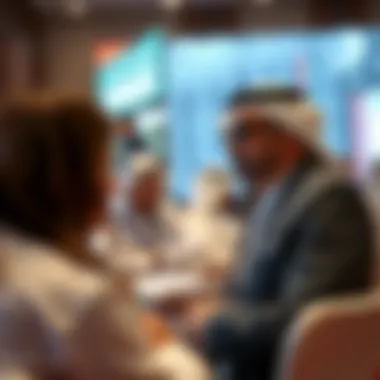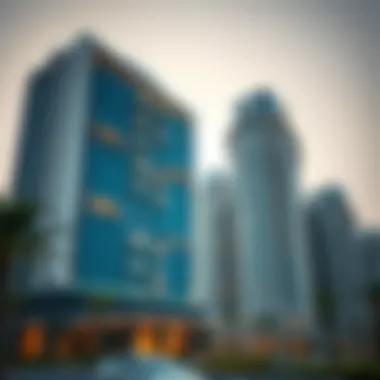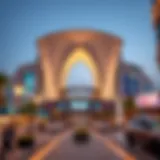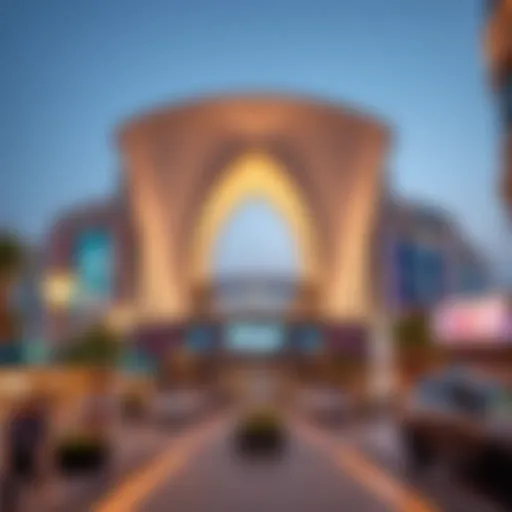Abdulwahed Bin Shabib: Impact on Dubai Real Estate


Intro
Abdulwhaed Bin Shabib is more than just a name in the bustling landscape of Dubai's real estate; he represents a critical pivot on which many trends and decisions hinge. For those involved in the property market—be it investors, homebuyers, or real estate professionals—understanding Abdulwahed's impact cannot be overstated. His strategic initiatives and the developments he has influenced shape the very fabric of this dynamic sector. Analyzing his contributions opens a window into the shifting currents of the Dubai real estate landscape, offering crucial insights into market directions.
As investors and stakeholders navigate the complexities of property buying and selling in Dubai, the relevance of Abdulwahed's work grows clearer. The insights provided in this article are designed to not only highlight his achievements but also to empower those looking to make informed decisions in their real estate endeavors.
Market Insights
Current Trends in Dubai Real Estate
Dubai's real estate market is an ever-evolving entity. If you take a look around, you'll notice a few key trends that have begun to define the current landscape. Notably, there’s been a substantial shift towards sustainable developments, fitting the global call for environmental consciousness.
Many developers are integrating eco-friendly amenities into their projects, which resonates well with contemporary buyer preferences. Additionally, the rise of smart homes is hard to ignore. Buyers are increasingly looking for properties equipped with advanced technology that promises convenience and efficiency.
Another trend that can’t be missed is the influx of foreign investment. Economic reforms and relaxed regulations have opened the door wider, making it easier for overseas buyers to step into the market. This has not only diversified the buyer pool but also pushed property values upward in certain areas.
Impact of Economic Factors on Property Prices
The economics of Dubai are tightly interwoven with property prices, as the market often feels the ripple effects of global and local economic factors. For instance, fluctuations in oil prices sometimes cast long shadows over the property sector, affecting everything from purchasing power to investment propensity.
Moreover, periods of economic growth typically fuel demand for residential and commercial properties alike. Investors, keen on capitalizing on these growth phases, often drive up prices in sought-after areas, leading to a competitive market landscape.
Furthermore, changes in interest rates, inflations, and government policies also play significant roles. The introduction of new laws, such as the recent reforms allowing 10-year visas for foreign investors, directly impacts buyer sentiment and purchasing behavior.
Understanding these economic factors is crucial for anyone looking to make a mark in the Dubai real estate game.
Investment Opportunities
Best Neighborhoods for Investment
When pondering where to invest, knowing the lay of the land can be invaluable. Some neighborhoods have consistently emerged as top picks among savvy investors. For instance:
- Downtown Dubai: A prime location that boasts iconic landmarks. It's a hot spot for both residential and commercial investment.
- Dubai Marina: Renowned for its waterfront lifestyle, it continues to draw attention from both locals and expats.
- Jumeirah Village Circle: Offering a range of affordable properties, it’s perfect for first-time investors looking for growth potential.
These areas not only promise attractive returns but are also well-connected to essential services and entertainment, making them ideal for prospective buyers.
Emerging Real Estate Projects in Dubai
Keeping an ear to the ground about ongoing and upcoming projects is critical for making sound investment choices. Some notable developments that are stirring excitement include:
- Dubai Creek Tower: This ambition aims to surpass the Burj Khalifa in height, marking a significant achievement in architecture.
- Meydan One Mall: Expected to be a shopping haven, this project will attract tourists and residents alike.
Investors must remain vigilant about these emerging projects as they hold promise for future appreciation in property values.
"Investing in Dubai real estate isn't just about buying property—it's about seizing opportunities that align with market dynamics."
Ultimately, as the landscape matures, the role of influencers like Abdulwahed Bin Shabib cannot be overlooked. Understanding these dynamics and trends will arm investors and stakeholders with the insights necessary to venture into the vibrant and evolving market of Dubai.
Prologue to Abdulwahed Bin Shabib
Abdulwahed Bin Shabib is a significant figure in the Dubai real estate sector, largely due to his innovative approach and strategic outlook. His influence extends beyond mere transactions; he embodies a vision of what the future of real estate could be in a rapidly evolving market. Understanding his background and career trajectory provides valuable context for evaluating the larger landscape of real estate in Dubai.
The exploration of Bin Shabib's philosophy in real estate opens up discussions about sustainable development and community-oriented projects. As the industry grapples with modern challenges, his contributions illustrate a pivotal shift towards not just building properties, but cultivating vibrant communities.
This article aims to shed light on Bin Shabib's impact, offering insights that serve investors, homebuyers, and real estate professionals. By diving into his career and philosophies, we not only map his journey but also the broader shifts taking place in Dubai's property market.
"Real estate is not just about bricks and mortar; it's about building futures."
As we unpack the layers of his involvement, we invite readers to consider how his methods and insights can inform their own ventures in real estate. With the stakes high in this bustling market, understanding the narratives of influential players like Abdulwahed Bin Shabib is more crucial than ever.


The Dubai Real Estate Landscape
The real estate landscape in Dubai is a vibrant and dynamic arena, bustling with opportunities and challenges. As a global hub for commerce, tourism, and luxury living, the city's property market serves as a barometer of economic health and innovation. The significance of exploring this landscape lies not just in understanding its current state but also in assessing the potential it holds for various stakeholders, including investors, homebuyers, and industry professionals.
Market Overview
The Dubai real estate market has witnessed tremendous growth over the years, with a current emphasis on both residential and commercial developments. In 2023, the market recorded impressive year-on-year gains, propelled by an influx of foreign investments and an improved regulatory framework. The diverse property types available, from high-rise apartments in Dubai Marina to sprawling villas in Palm Jumeirah, cater to a wide range of preferences and budgets.
Factors such as Dubai's strategic location, robust infrastructure, and a thriving expatriate community further amplify its appeal. Not to mention, the upcoming Expo 2025 is expected to add more fuel to this already roaring fire, attracting millions of visitors and investors alike. Investors are now increasingly looking toward off-plan developments, spurred by the potential for greater returns. Local sentiment is leaning toward optimism amidst a flourishing economy—which is always a good sign for those looking to jump into the market.
Key Players in the Market
The Dubai real estate market is not a lone wolf; it's an ecosystem bustling with major players, each contributing unique value. Among them, developers like Emaar Properties and Nakheel stand out for their ambitious projects and high-profile launches. These companies are known for pushing the envelope, creating not just buildings but entire communities.
Established Developers
- Emaar Properties: Behind landmark developments such as Burj Khalifa, Emaar is synonymous with luxury. Their portfolio includes retail, hospitality, and residential sectors.
- Nakheel: Known for creating iconic waterfront locations, Nakheel’s projects like The Palm Islands scrimp the boundaries of innovation.
Real Estate Agencies
- Core Savills: Leading in consultancy and property management, they offer insights that are invaluable to investors.
- Betterhomes: This agency emphasizes understanding customer needs, helping buyers navigate the vast options in the market.
Financial Institutions
- Dubai Islamic Bank and Emirates NBD: These institutions provide vital mortgages and financing options, further easing the purchase process for potential homeowners.
From ambitious developers to strategic agents, the interplay between these players fuels the market's growth. Each entity works collaboratively and competitively to shape the landscape, providing options that cater to a diversifying clientele. Understanding these dynamics can significantly affect investment decisions and strategic planning in the realm of Dubai real estate.
"Dubai’s real estate market thrives on innovation and diversity, reflecting the multifaceted nature of its economy. Investors must keep a pulse on the developments and trends to capitalize effectively."
By dissecting the intricacies of the market and recognizing the power players involved, potential investors are better equipped to navigate the Dubai real estate waters with confidence.
Abdulwahed Bin Shabib's Contributions
Abdulwahed Bin Shabib has always been a beacon of innovation in Dubai's real estate industry. His contributions are not merely transactional; they embody a vision for a sustainable and thriving urban future. Each project or initiative he leads marks a significant step forward for the sector, enhancing its dynamics and ensuring it stays ahead in a competitive market. What sets his work apart is his ability to not just adapt but to anticipate market needs, demonstrating a keen understanding of both local and international real estate climates.
Innovative Projects
Residential Developments
When talking about residential developments, it is impossible to overlook the striking impact Abdulwahed Bin Shabib has had in shaping modern living spaces in Dubai. One standout characteristic of these residential projects is their adaptability; they cater to various demographics—from luxury seekers to more modest families. This varied approach ensures a wider audience and enhances community diversity.
A unique feature of these residential developments is their integration of smart home technologies, right from design. This forward-thinking approach not only enhances comfort but also promotes energy efficiency, a growing trend among today's homebuyers who are more conscious of sustainability. However, there are challenges as well. While high-tech amenities are appealing, they also add to the overall cost, which could deter some potential buyers. Still, the long-term advantages in terms of utility savings may far outweigh initial expenses.
Commercial Ventures
In the realm of commercial ventures, Abdulwahed Bin Shabib’s influence is equally profound. These ventures include a range of facilities from office towers to shopping complexes, all designed with a user-centric focus. The hallmark of his commercial projects is their mixed-use design, encouraging a blend of work, play, and living spaces.
A significant advantage of this design is its contribution to urban vibrancy; it allows for a seamless lifestyle where residents can enjoy amenities just a stone's throw away. However, the downside can be the congestion in areas that are already high-traffic. Thus, careful planning and traffic assessments are crucial to avoid logistical nightmares for residents and visitors alike.
Sustainability Initiatives
Green Building Compliance
Abdulwahed Bin Shabib's commitment to sustainability is showcased predominantly through his advocacy for green building compliance. This initiative emphasizes not just energy efficiency but also the responsible use of resources, aligning with global sustainability goals. A noteworthy aspect of this compliance is its capacity to reduce operational costs for both builders and occupants.
One of the most tangible benefits of this initiative is the positive environmental impact it leaves behind—for example, lower carbon footprints and improved air quality in urban settings. Despite some hurdles like higher upfront costs, the benefits of energy savings and government incentives for green building often create a strong argument for compliance among developers.
Public Spaces Enhancement
The enhancement of public spaces in Abdulwahed’s projects speaks volumes about his vision for community development. These improvements typically focus on creating spaces that encourage social interaction and community gatherings. An inviting public realm not only beautifies an area but also fosters a sense of belonging among residents.


On the flip side, one challenge can be the maintenance of these spaces, which requires constant attention and funding. While initial investments in beautification and landscaping may seem steep, the returns in terms of increased property values and community satisfaction often justify the costs involved.
In summary, Abdulwahed Bin Shabib's contributions to the Dubai real estate sector are vital, exhibiting a blend of innovation, sustainability, and community focus that is undeniably impressive. His work serves as a model for aspiring developers and provides a clear vision for the future of urban living in Dubai.
Investment Strategies in Dubai Real Estate
When delving into the intricate realm of Dubai's real estate market, it's essential to comprehend the various investment strategies that can steer stakeholders towards fruitful ventures. For investors and homebuyers alike, understanding these strategies aids in making informed decisions that align with long-term goals while mitigating risks inherent in such a vibrant market.
Long-term Growth Potential
Investors eyeing Dubai's real estate sector often gravitate towards the notion of long-term growth potential. This perspective is critical, not only for preserving capital but for maximizing returns as the market evolves. The city’s burgeoning infrastructure and booming economy drive consistent population growth, creating a robust demand for housing and commercial spaces. Additionally, with ongoing projects like the Expo 2020 legacy developments and futuristic plans outlined in the Dubai 2040 Urban Master Plan, opportunities abound.
The focus on long-term investment signifies:
- Stability Over Speculation: Rather than engaging in frantic buy-and-flip strategies, a long-term outlook promotes a more stable approach, cushioning investors against short-term market volatility.
- Appreciation of Assets: Properties in regions experiencing high developmental activity tend to appreciate significantly over time. Investors who hold onto their assets can potentially reap substantial benefits.
- Rental Income: With a continuous influx of expatriates and tourists, rental properties in well-chosen locations can yield sustained cash flow. This can be particularly rewarding in emerging neighborhoods poised for growth.
Understanding this landscape highlights the considerable allure of Dubai real estate as a haven for long-term investment.
Risk Assessment Approaches
Navigating the waters of real estate demands a keen understanding of potential risks, and in Dubai, this is no exception. Investors must engage in thorough risk assessment approaches to safeguard their investments from unforeseen challenges.
Risks in the market may arise from:
- Regulatory Fluctuations: Investors should be aware of any changes in local laws and regulations that could impact property ownership and development. Staying updated with Dubai Land Department announcements can be invaluable.
- Market Cycles: Just like any other market, Dubai’s real estate sector can be cyclical. Conducting thorough analyses of market trends can help investors time their entries and exits more judiciously.
- Economic Factors: Global economic conditions often influence the local market. Investors need to keep an eye on international economic indicators that could lead to potential downturns or growth phases.
Some effective approaches for assessing risks include:
- Due Diligence: Performing meticulous research before investments is essential. This encompasses analyzing property history, location dynamics, and upcoming developments in the vicinity.
- Diversification: Instead of placing all bets on one property or area, diversifying investments across different types or geographical locations can minimize risk exposure.
- Engaging Experts: Collaborating with local real estate professionals who possess deep market knowledge can provide crucial insights.
As investors navigate the landscape, maintaining a clear-eyed view of potential risks and employing effective assessment strategies ensures that they can confidently tackle the uncertainties of the Dubai real estate market.
The right investment strategy is not just about capitalizing on current trends; it’s about preparing for what’s around the corner.
Market Trends Influenced by Abdulwahed Bin Shabib
Abdulwahed Bin Shabib’s contributions to Dubai’s real estate sector extend beyond mere transactions and developments; they also encompass active shaping of market trends. An understanding of the trends he has influenced provides valuable insights for investors and professionals navigating this dynamic landscape. Here, we’ll explore two significant trends that have emerged due to his vision: burgeoning neighborhoods and technological integration.
Emerging Neighborhoods
One of the most striking influences Abdulwahed Bin Shabib has had on Dubai's real estate market is the development of emerging neighborhoods that appeal to both buyers and renters. These areas, often overlooked in favor of established districts like Downtown Dubai or Palm Jumeirah, are becoming increasingly desirable due to thoughtful urban planning and strategic initiatives.
For instance, initiatives in areas such as Dubai Creek Harbour and Dubai South showcase Bin Shabib's foresight in identifying locations ripe for growth. These up-and-coming neighborhoods not only offer a fresh alternative to traditional hotspots but also feature modern infrastructure paired with a sense of community that resonates with both locals and expatriates.
Some notable aspects of these emerging neighborhoods include:
- Affordable Housing Options: Bin Shabib advocates for projects that cater to different income brackets, ensuring inclusivity in his developments.
- Community-Centered Designs: Many projects include communal spaces such as parks and gathering areas, emphasizing interaction among residents.
- Accessibility and Sustainability: Improvements in transportation links and environmentally sustainable practices are pivotal in attracting interest.
As potential investors look towards opportunities in these neighborhoods, they should consider the long-term value of investing in areas that are on the rise, supported by solid development plans and infrastructure improvements.
Technological Integration
The integration of technology within the real estate sector is no longer a trend but a necessity. Abdulwahed Bin Shabib’s approach to technological integration has led to innovative solutions that enhance operational efficiency and improve the customer experience. This has become especially relevant in a rapidly modernizing market like Dubai.
Applications of technology in the real estate ventures influenced by Abdulwahed include:
- Smart Home Concepts: Projects often incorporate the latest in smart technology, from energy-efficient appliances to advanced security systems.
- Real Estate Platforms: His developments frequently utilize tech platforms to streamline the buying process, making it easier for buyers to access information and manage their investments.
- Virtual Reality Tours: Providing potential buyers and investors with virtual tours of properties can greatly enhance their decision-making process, enabling a more immersive experience without geographical limitations.
The benefits of these innovative technologies not only improve the sales process but also contribute to transparency, accountability, and enhanced accessibility. As more technological advancements are integrated, they play a crucial role in keeping Dubai at the forefront of global real estate, captivating investors and homebuyers alike.


Challenges in Dubai's Real Estate Market
The real estate market in Dubai stands at a crossroads, where opportunity and challenge often intertwine. As we delve into the challenges that shape the dynamics of this vibrant sector, it's imperative to recognize that these hurdles don't merely hinder progress; they demand innovative solutions and adaptability from stakeholders. For investors, homebuyers, and all involved, understanding these challenges paves the way for informed decisions and strategic planning.
Regulatory Hurdles
Navigating the regulatory landscape in Dubai's real estate market is akin to traversing a maze; one misstep can lead to significant delays or financial strain. The government's drive to regulate transactions and ensure transparency is paramount. However, the complexity of these regulations can serve as a stumbling block. The introduction of new laws, such as the recent amendments to the property ownership law, aims to bolster investor confidence. Still, for many, the red tape can feel overwhelming.
- Licensing and Permits: Each project often requires a slew of permits and inspections, which can drag on, hindering development timelines.
- Land Use Policies: Developers must navigate various land use regulations that can restrict how properties can be developed or modified, sometimes stifling creativity and growth.
Abdulawahed Bin Shabib has often spoken of the pressing need for regulatory reform that could streamline these processes. Engaging with local authorities to advocate for clearer guidelines is crucial. Progress in this arena can lead to a more efficient marketplace, with faster transactions benefiting everyone in the end.
Market Volatility
Market volatility can be viewed as a double-edged sword in Dubai's real estate sector. On one hand, peaks in property prices attract significant investment, while on the other, sharp declines can erode investor confidence and slow sales.
- Economic Fluctuations: The market is sensitive to broader economic trends, such as oil prices and global economic health. When oil prices dip, so does economic confidence in the region.
- Speculation: The rise of speculation can inflate property values beyond realistic levels. Once investors pull back, the market can crash, leading to a cycle of boom and bust that discourages long-term investment.
"Understanding market cycles and their patterns allows investors to seize opportunities and mitigate risks effectively."
This volatility creates an environment where informed decision-making is essential. Investors need to remain vigilant, monitor economic indicators, and embrace a realist approach to forecasting. It is amidst these challenges that Abdulwahed Bin Shabib exemplifies strategic foresight, inspiring others to think beyond immediate trends and toward sustainable growth.
In summary, the challenges within Dubai's real estate market necessitate a nuanced understanding of both regulatory complexities and market dynamics. For stakeholders, addressing these issues not only helps in maximizing potential returns but fosters a resilient and thriving real estate environment.
Future Outlook for Abdulwahed Bin Shabib and Dubai Real Estate
To understand the future dynamics of Dubai's real estate sector, one must look closely at the impactful presence of Abdulwahed Bin Shabib. His reputation as a forward-thinking leader positions him at the forefront of market evolution. As investors, homebuyers, and real estate professionals gear up for upcoming shifts, appreciating his strategic foresight can illuminate the path ahead. This section aims to explore not only the directions the market might take under his influence but also the nuances that come into play as it adapts to new challenges and opportunities.
Projected Market Developments
The real estate landscape in Dubai is poised for several intriguing developments. A mix of local and international investments is anticipated, with the upcoming EXPO events serving as a catalyst for growth. Properties along the Dubai waterfront could see heightened demand as the waterfront lifestyle becomes increasingly appealing. Moreover, urban regeneration projects could redefine older neighborhoods, transforming them into vibrant mixed-use communities.
Some noteworthy trends to keep an eye on include:
- Sustainable Development: Projects with sustainability in mind are expected to gain great traction. This includes developments incorporating green building practices and renewable energy solutions, in line with the UAE's long-term vision for the environment.
- Smart Cities: The integration of technology into urban planning is vital. Areas such as Dubai Silicon Oasis are already paving the way for tech-friendly spaces that cater to the digital age, attracting startups and tech giants alike.
- Affordable Housing: With a continuous influx of expatriates, the demand for affordable housing options will likely rise. There’s potential for new projects to emerge targeting this demographic, ensuring everyone has a slice of the Dubai dream.
"The real estate market is not just about concrete and steel; it embodies the dreams of individuals"
Strategic Visions Ahead
With Abdulwahed Bin Shabib at the helm, the future strategies for growth and resilience in Dubai’s real estate are likely to embody a holistic approach.
- Focus on Community Engagement: Enhancing community spaces to foster a sense of belonging will be paramount. Initiatives that invite public participation could increase investments in local projects and boost the desirability of emerging neighborhoods.
- Strengthening Partnerships: Collaborations between private developers and governmental agencies can create waves of innovative solutions. Shared resources will increase efficiency and transparency in the sector.
- Adaptation to Market Changes: Investing in research to keep pace with shifting consumer preferences is crucial. As market demands evolve, agility in project planning and execution can set a firm foundation for success.
As these strategic visions unfold, Abdulwahed Bin Shabib’s commitment to innovation and effective leadership will undoubtedly inspire confidence among stakeholders, ensuring that Dubai's real estate continues to thrive well into the future.
Ending
This article has highlighted the pivotal role of Abdulwahed Bin Shabib in reshaping the landscape of Dubai's real estate market. His contributions not only reflect his personal ambitions but also embody a vision for the future of real estate in a rapidly evolving global environment.
Summarizing Abdulwahed Bin Shabib's Impact
Abdulwahed's impact on the Dubai real estate sector is both profound and wide-ranging.
- Innovative Projects: The developments spearheaded by Abdulwahed set new standards for luxury and livability, attracting both local and international investors. His ventures marry aesthetic appeal with practical functionality, creating spaces that resonate with the needs of contemporary inhabitants.
- Sustainability Initiatives: Abdulwahed’s commitment to sustainable practices stands as a model for future projects. By incorporating green technologies and enhancing public spaces, he not only addresses environmental concerns but also enriches community life. This reflects a deeper understanding of real estate’s role beyond mere transactions.
- Market Trends and Strategy: Abdulwahed has navigated the market's ups and downs, using his insights to predict trends that others may overlook. His ability to spot emerging neighborhoods before they become mainstream showcases his strategic prowess and adds another layer to his contributions.
In many respects, Abdulwahed Bin Shabib is not just a player in the Dubai real estate field. He's a vital force, driving the sector toward a future that embraces innovation and sustainability.
Call to Action for Investors
Investors eyeing opportunities in Dubai’s real estate market should take heed of Abdulwahed's strategies and insights. Here are some points to consider:
- Research Emerging Areas: The neighborhoods identified and developed by Abdulwahed offer promising investment opportunities, poised for appreciation.
- Embrace Sustainability: As more buyers gravitate toward eco-friendly options, aligning investments with sustainability could yield higher returns while contributing positively to the environment.
- Stay Informed: Keeping abreast of market trends and Abdulwahed's future projects can provide an edge in making informed investment decisions.
- Engage with Local Experts: Collaborating with professionals who understand the nuances of Dubai's real estate can mitigate risks and maximize opportunities.
Investors must recognize that engaging with market leaders like Abdulwahed is crucial in navigating this complex landscape. By aligning their investment approaches with the insights and values exhibited by prominent figures in the industry, they position themselves for success.
"Success in real estate comes not just from what you know but who you align with. The insights from leaders like Abdulwahed offer not just knowledge, but a pathway to future success."







